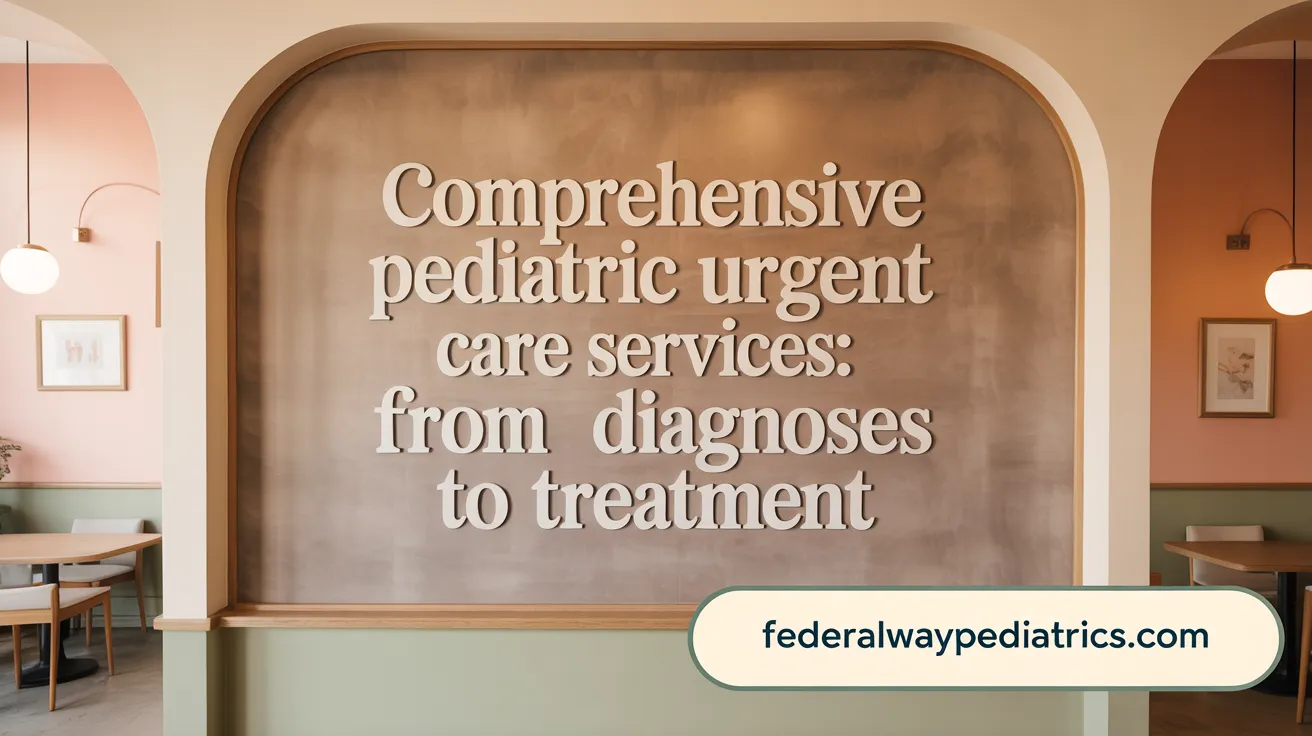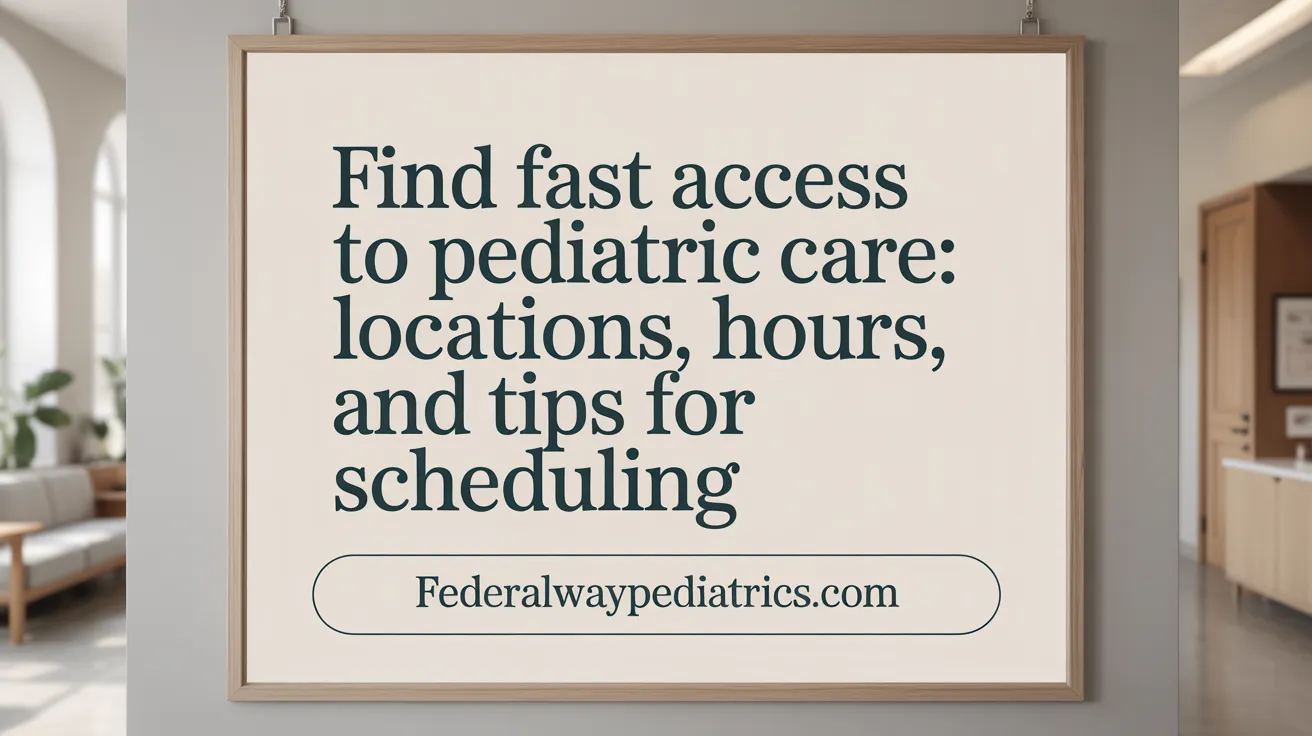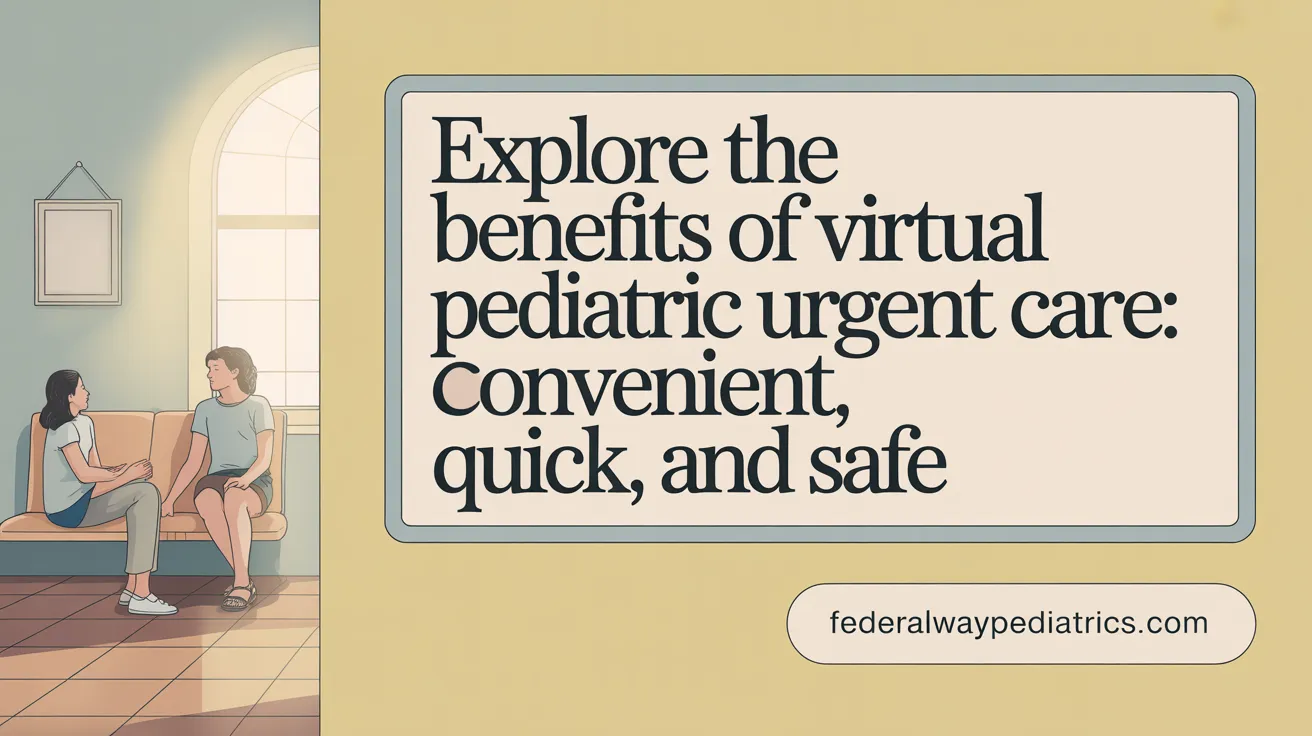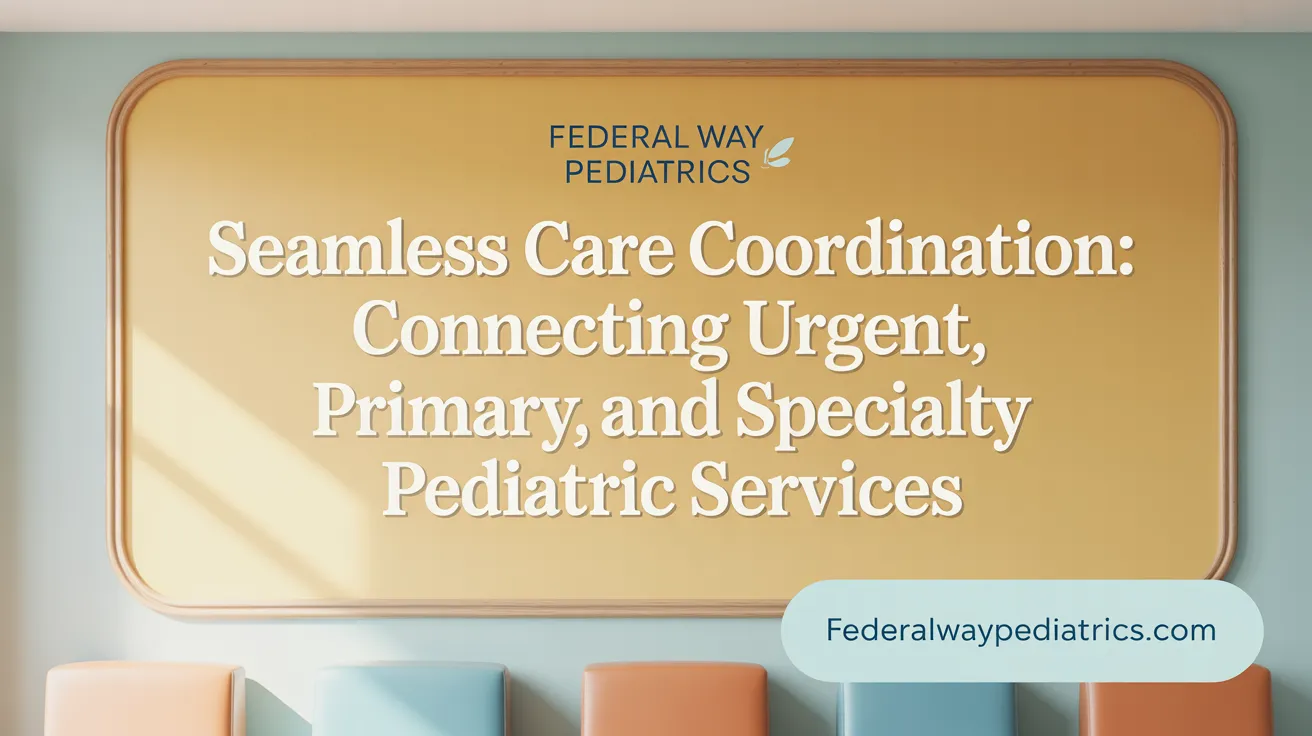Understanding the Importance of Same-Day Pediatric Care
The Significance of Same-Day Urgent Care Visits for Children
Prompt medical attention through same-day pediatric visits can significantly improve outcomes for many common childhood illnesses and injuries. Quick care helps in alleviating discomfort, preventing complications, and reducing anxiety for both children and their parents. Conditions such as ear infections, fever, asthma exacerbations, sores, minor burns, and injuries benefit from immediate evaluation and treatment.
When to Consider Urgent Care Versus Emergency Care
Parents should choose urgent care when their child experiences non-life-threatening conditions like cold and flu symptoms, minor cuts or fractures, sprains, and skin rashes. Urgent care centers are staffed by pediatric-trained professionals familiar with children's unique needs, making them a suitable choice outside of normal office hours. However, for severe symptoms such as difficulty breathing, unconsciousness, uncontrollable bleeding, severe burns, or chest pain, emergency care or calling 911 is imperative to ensure rapid and comprehensive treatment.
Overview of Pediatric Urgent Care Availability
Pediatric urgent care clinics, like those in Federal Way and Puyallup, offer accessible services seven days a week, including evenings and weekends. Many centers accept appointments and offer walk-in options with some availability limitations. Additionally, virtual urgent care services are available in several locations within Washington state for convenient assessment and guidance without visiting in person. These clinics provide specialized pediatric care staffed by board-certified physicians, nurse practitioners, and physician assistants focused on children's health, emphasizing prompt, compassionate care tailored for young patients.
Access to same-day pediatric urgent care supports families in managing common childhood ailments efficiently while helping avoid unnecessary emergency room visits.
What Services Are Typically Offered at Pediatric Urgent Care Centers?

What conditions are commonly treated at pediatric urgent care clinics?
Pediatric urgent care clinics address a broad range of common and urgent health concerns in children and young adults up to 20 or 21 years old. Typical conditions treated include allergies; asthma attacks; common cold and flu symptoms; ear infections and earaches; fevers; minor burns and cuts; skin rashes; sore throats; sprains; urinary complaints; vomiting; diarrhea; and mild abdominal pain. These clinics provide immediate care for these ailments, offering a convenient alternative to emergency rooms for non-life-threatening issues.
What diagnostic services are available during urgent pediatric visits?
Many pediatric urgent care clinics offer on-site diagnostic services to enable timely and accurate evaluation. These often include laboratory testing and X-ray imaging for injuries and infections. Additionally, virtual urgent care has become an important service, allowing families to access pediatric care via video visits. This option is convenient for minor illnesses and injuries and is typically available to children within the state. Virtual visits support quick diagnosis and treatment planning without the need for an in-person appointment.
Who provides care in pediatric urgent care centers?
Care is delivered by highly trained pediatric specialists, including board-certified physicians (MD and DO), pediatric nurse practitioners, physician assistants, and supporting clinical staff. These professionals focus exclusively on pediatric care, ensuring that children and young adults receive specialized assessment and treatment tailored to their unique health needs. Their expertise spans both urgent medical issues and coordination of follow-up care with primary pediatricians. Providers include pediatricians and nurse practitioners from reputable pediatric urgent care services.
These services collectively ensure that pediatric urgent care centers provide accessible, specialized, and prompt medical attention for children’s urgent health needs, supporting families with comprehensive pediatric expertise both in person and virtually.
Accessing Urgent Pediatric Care: Locations, Hours, and Appointment Tips

Where can families find urgent pediatric care in the Federal Way and Puyallup areas?
Families seeking urgent pediatric care in the Federal Way area may visit Seattle Children's Urgent Care Clinic located at 34920 Enchanted Parkway South. In Puyallup, Mary Bridge Children's Urgent Care offers care near the Washington State Fairgrounds. Additional urgent care options include the Mary Bridge Urgent Care Centers at Woodcreek in Puyallup and nearby Allegro Pediatrics clinics in Bothell and Bridle Trails. These locations provide specialized pediatric urgent care clinics for children and young adults up to age 20 or 21.
What are the typical operating hours and scheduling policies for these clinics?
Seattle Children’s Federal Way clinic operates seven days a week, including holidays. Weekday hours are from 4 p.m. to 10:30 p.m., while weekend hours run from 11 a.m. to 8 p.m. Mary Bridge Children's in Puyallup is open weekdays from 8 a.m. to 9 p.m. and weekends from 9 a.m. to 4 p.m. Most clinics emphasize booking same-day or next-day appointments online to reduce wait times. Walk-in visits are limited and cannot be guaranteed due to high demand, so scheduling in advance is recommended. These clinics offer walk-in and appointment urgent care and highlight same-day urgent care appointments.
What should parents consider regarding transportation and insurance coverage?
Many urgent care clinics offer free parking to families arriving by car. They are generally accessible via public transit options as well, making it easier for families without private transport. It is important for parents to verify if their insurance plan is accepted before the visit, as most major insurance plans are widely accepted with some exceptions. To speed up check-in, parents should bring their insurance cards and identification documents. For specific information about insurance and accepted plans, parents can refer to the insurance accepted urgent care details offered by these clinics.
Virtual Pediatric Urgent Care: An Increasingly Convenient Alternative

What is virtual pediatric urgent care and how can families access it?
Virtual pediatric urgent care enables families to connect with pediatric healthcare providers through video visits using a smartphone, tablet, or computer. This service is designed specifically to diagnose and develop treatment plans for minor illnesses and injuries in children and young adults without the need for an in-person visit. Families can access virtual urgent care from their homes as long as the patient is within the state where the service is offered, such as Washington state. This option is particularly helpful outside regular office hours or when immediate care is needed but a clinic visit is not feasible. For example, Mary Bridge Children's Urgent Care and Seattle Children's Urgent Care offer virtual urgent care services in Washington.
Are there limitations or state residency requirements for virtual urgent care?
Virtual pediatric urgent care has certain restrictions. One primary limitation is that the child must be physically located in the state where the service is provided to comply with medical licensing regulations. Additionally, virtual visits are generally reserved for minor, non-life-threatening conditions that can be safely managed without physical examination or diagnostic testing. Emergencies and serious health issues require in-person assessment or immediate emergency services. Providers also advise that virtual urgent care complements rather than replaces in-person care when procedures or lab tests are necessary. More details can be found at Seattle Children's Urgent Care Clinics and Mary Bridge Children's Urgent Care.
What are the benefits of virtual pediatric urgent care?
Virtual urgent care offers families significant convenience by allowing children to receive prompt medical attention from home. This reduces the risk of exposure to other illnesses in waiting rooms and saves travel time, especially for families in remote or underserved areas. It also provides easier access during evenings, weekends, and holidays when regular pediatric offices may be closed. For minor ailments, virtual visits can quickly address concerns, deliver treatment plans, and guide follow-up care. This modality helps streamline healthcare access while preserving the option for urgent in-person evaluation if needed. For comprehensive care options and same-day appointments, families can visit Allegro Pediatrics urgent care or Pediatrics Northwest – Mary Bridge Children’s.
Coordinating Urgent Pediatric Care with Primary and Specialty Services

How is follow-up care coordinated after an urgent pediatric visit?
Urgent care providers prioritize seamless follow-up by sending visit documentation to the child’s primary care provider within 24 hours. This ensures that primary pediatricians remain informed about any treatments or diagnoses made during the urgent care visit. Parents often receive guidance on symptoms to observe and instructions on when to seek additional medical attention if needed. This coordinated communication helps maintain a consistent and continuous care experience for the child. For more details, see Urgent Care Follow-Up Care Procedures.
How do urgent care services integrate with specialty pediatric care?
Many pediatric urgent care clinics are affiliated with specialized pediatric groups such as Mary Bridge Children’s Hospital and Seattle Children’s. These affiliations support smooth referral pathways when children require advanced evaluation or management for conditions like asthma, allergies, developmental concerns, or cardiology issues. Collaborative relationships between urgent care providers and specialty teams facilitate timely access to expert care, avoiding delays and improving health outcomes. Learn more about pediatric specialty care at Mary Bridge Children's Outpatient Center Federal Way and Pediatrics Northwest – Mary Bridge Children’s.
What tools are available for families to manage urgent pediatric healthcare?
To support family-centered care, many practices utilize online portals like MyChart patient portal. These platforms allow parents to conveniently schedule appointments, communicate directly with healthcare providers, view lab results, and manage prescriptions. Such tools empower families to stay actively involved in their child’s health care journey, enhance communication with care teams, and streamline urgent and follow-up care processes. For more information on pediatric appointment scheduling and provider communication, see Pediatrics Northwest – Mary Bridge Children’s.
Understanding When to Choose Urgent Care Versus Emergency Care for Your Child

When should parents choose urgent care instead of emergency care for their child?
Parents should choose urgent care for non-life-threatening conditions such as strains, sprains, minor cuts, earaches, mild asthma attacks, fevers, and minor infections. Urgent care clinics like those operated by Seattle Children's Urgent Care in Federal Way and Mary Bridge Children's Urgent Care Puyallup provide specialized pediatric urgent care clinics for these issues, often outside regular office hours, with appointments or limited walk-ins.
What should parents do in the event of a life-threatening pediatric emergency?
In emergencies involving severe difficulty breathing, chest pain, uncontrollable bleeding, head injury with loss of consciousness, or severe burns, parents are advised to call 911 or go directly to the nearest emergency room. Pediatric urgent care centers explicitly emphasize this protocol to ensure rapid and proper emergency management.
How do urgent care clinics support families during non-emergent situations?
Urgent care clinics offer an accessible alternative for children’s minor illnesses and injuries, reducing emergency room visits. Staffed by pediatric-trained doctors and nurse practitioners, they provide prompt evaluation and treatment for common symptoms like fever, ear infections, minor burns, and sprains. Many clinics also provide virtual urgent care options for convenient care at home. These services operate with flexible hours including evenings and weekends to accommodate families’ needs while coordinating follow-up care with primary providers. For more about the role of virtual options in these clinics, see the role of virtual urgent care in pediatric services.
Empowering Parents with Knowledge for Timely Pediatric Care
Overview of Pediatric Urgent Care Options
Parents in the Federal Way and Puyallup regions have access to multiple dedicated pediatric urgent care clinics including Mary Bridge Children’s Urgent Care in Puyallup and Seattle Children's Urgent Care in Federal Way.
These centers provide extended hours beyond regular pediatric office availability and accept same-day appointments, with virtual care options also offered for convenience and safety. Clinics are staffed by pediatric-trained, board-certified physicians and nurse practitioners focused on children's urgent health needs.
Best Practices for Accessing Care
Scheduling appointments in advance is recommended due to high demand, though limited walk-in availability exists. Virtual urgent care is a practical resource for non-emergency issues, removing travel barriers and reducing exposure risks.
Knowing when to seek urgent care versus emergency services ensures appropriate use of resources; life-threatening symptoms always require immediate 911 contact.
Encouraging Preparedness
Parents are encouraged to familiarize themselves with nearby urgent care locations, verify insurance coverage, and use online portals for appointment management to reduce wait times and streamline care delivery.
Ensuring Child Health and Safety
Remaining proactive by monitoring illness symptoms and utilizing available urgent care services promptly can reduce complications and promote faster recovery for children and young adults.
Through planned use of these specialized pediatric resources, families can confidently navigate urgent health issues with expert support tailored to children’s unique needs.
